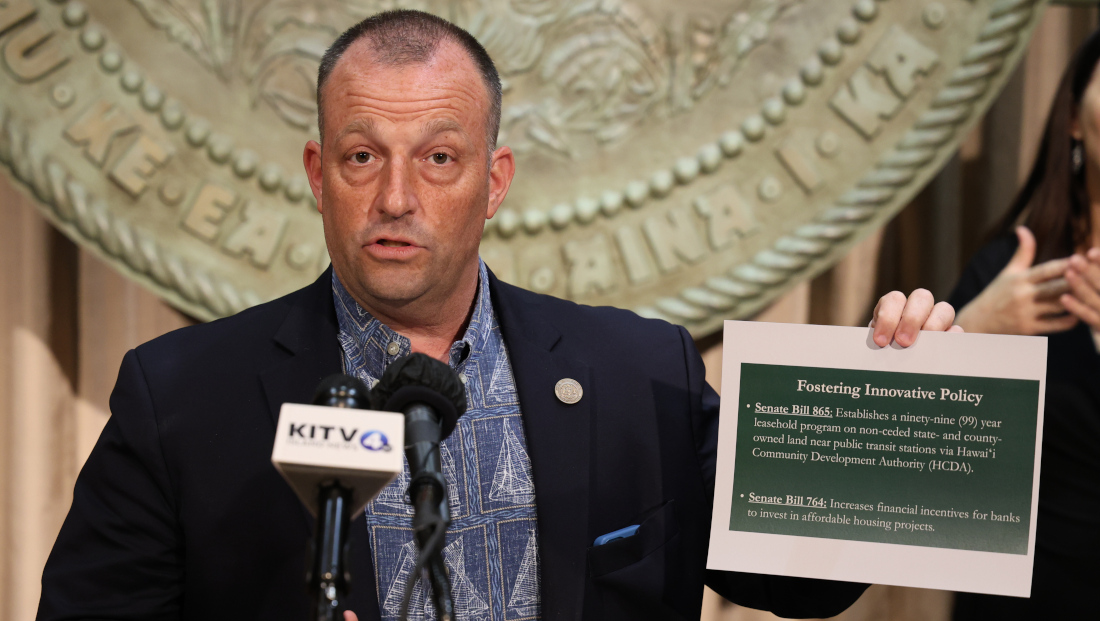(BIVN) – Hawaiʻi Governor Josh Green, M.D., on Wednesday signed several bills concerning affordable housing and homelessness.
“Since taking office, tackling the hard issues of housing and homelessness has been at the forefront of my Administration’s efforts,” said Governor Green. “Unless we address the lack of affordable housing in our state head-on, the housing crisis will continue to affect the quality of life for all our communities, which is why I am pleased to be signing various bills that work to provide some solutions to help those most in need.”
The Office of the Governor provided this description of the bills signed into law:
Act 96 (SB764) will allow banks to invest in entities formed to invest in developing residential properties that qualify for low-income housing tax credits. This bill encourages the financing of affordable residential housing projects by increasing the investment limit.
Act 97 (SB865) will establish a 99-year leasehold program to develop low-cost homes on state- and county-owned land in an urban redevelopment site to be sold in leasehold by the Hawaiʻi Community Development Authority to qualified residents. This bill will increase the number of affordable residential leasehold units in our state.
“With Act 97 (SB865), the state for the first time will take direct responsibility for reversing the housing shortage by providing income-blind, revenue-neutral, 99-year leasehold homes for all of Hawaiʻi’s people,” said Senator Stanley Chang (Senate District 9, Hawai‘i Kai, Kuli‘ou‘ou, Niu, ‘Āina Haina, Wai‘alae-Kāhala, Diamond Head, Kaimukī, and Kapahulu). “It’s a proven model that has worked in Singapore and will finally enable every generation of local people to have a good life here in Hawaiʻi. Thank you to Governor Green for signing this bill, to Senate President Kouchi and my colleagues in the Senate and House, and all the many supporters who have fought for this concept since 2018.”
Act 98 (SB898) temporarily expands the State Rent Supplement Program specifically for qualified persons who are sixty-two years of age or older and are homeless or at imminent risk of becoming homeless. Funding from the Hawaiʻi State Rent Supplement Program will help eligible families by subsidizing part of their monthly rent. It is mainly geared toward helping kūpuna and older adults and families to avoid becoming homeless.
Act 99 (HB674) repeals the percentage requirements related to the Hawaiʻi Public Housing Authority’s (HPHA) admission of applicants into federal and state low-income public housing units. This gives HPHA the ability to prioritize its public housing inventory to allow greater preference for those who are the most in need, including families and individuals experiencing homelessness, victims of domestic violence, and those who are displaced.
“This was a monumental year in making significant progress toward addressing the affordable housing crisis in Hawaiʻi. We are immensely proud of our focused efforts in providing housing relief to those who need it the most. Our continual priority has been to address the needs of asset-limited, low-income families, renters, Native Hawaiians, and our kūpuna population,” said House Committee on Housing Chair Troy Hashimoto (D-10, Waiehu, Wailuku, Waikapū, Sand Hills).
Additional bills signed by Governor Green on June 21, 2023 include:
SB1357 SD1 HD1 CD1, (Act 90) Relating to Affordable Housing on Hawaiian Home Lands
HB675 HD1 SD2 CD1, (Act 91) Relating to the Hawaiʻi Housing Finance and Development Corporation
HB677 HD1 SD2 CD1, (Act 92) Relating to the Dwelling Unit Revolving Fund
HB992 HD1 SD1 CD1, (Act 93) Relating to the Affordable Homeownership Revolving Fund
HB1366 HD1 SD2 CD2, (Act 94) Relating to Homelessness
HB1397 HD1 SD2 CD1, (Act 95) Relating to Supportive Housing


by Big Island Video News7:13 am
on at
STORY SUMMARY
HONOLULU, Hawaiʻi - State officials hope the bills will expand access to affordable housing and provide much-needed assistance to those at risk of becoming homeless.